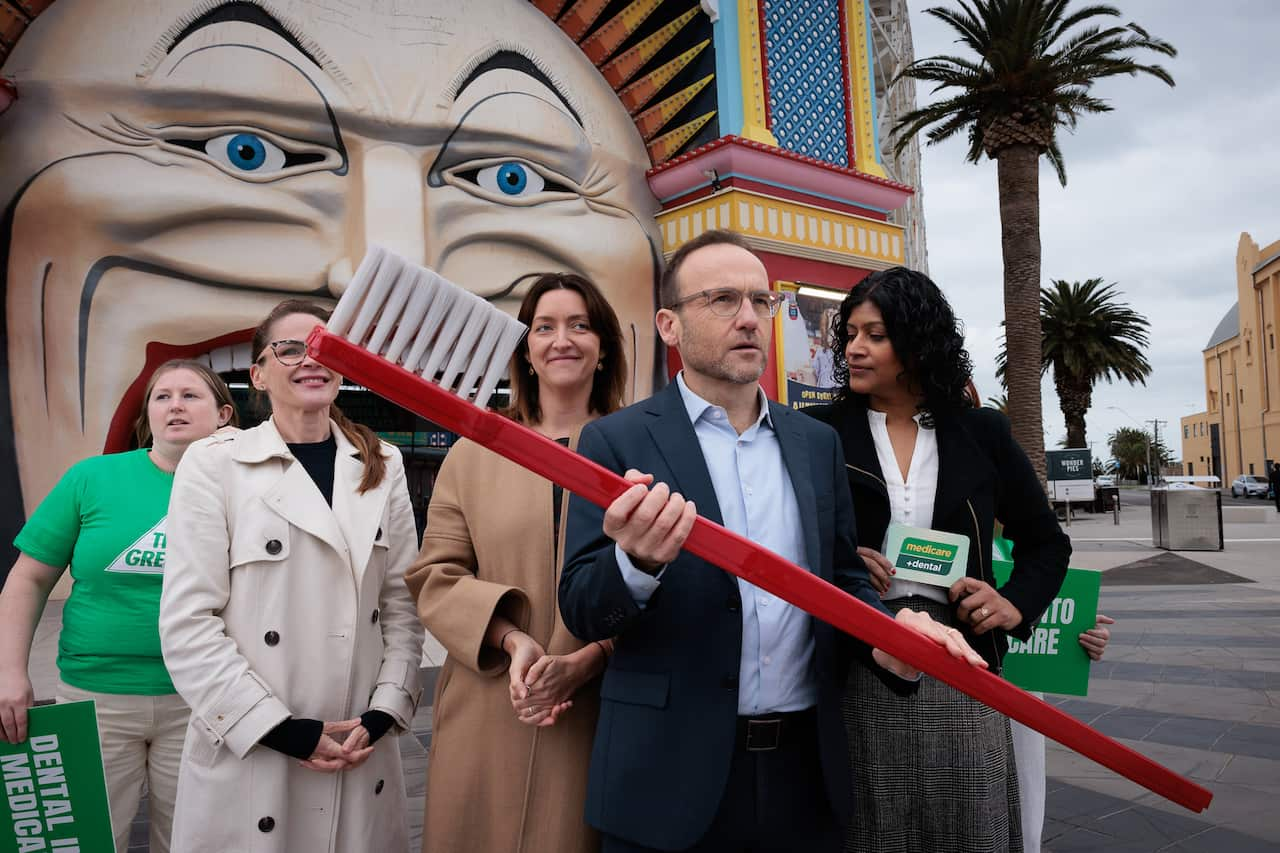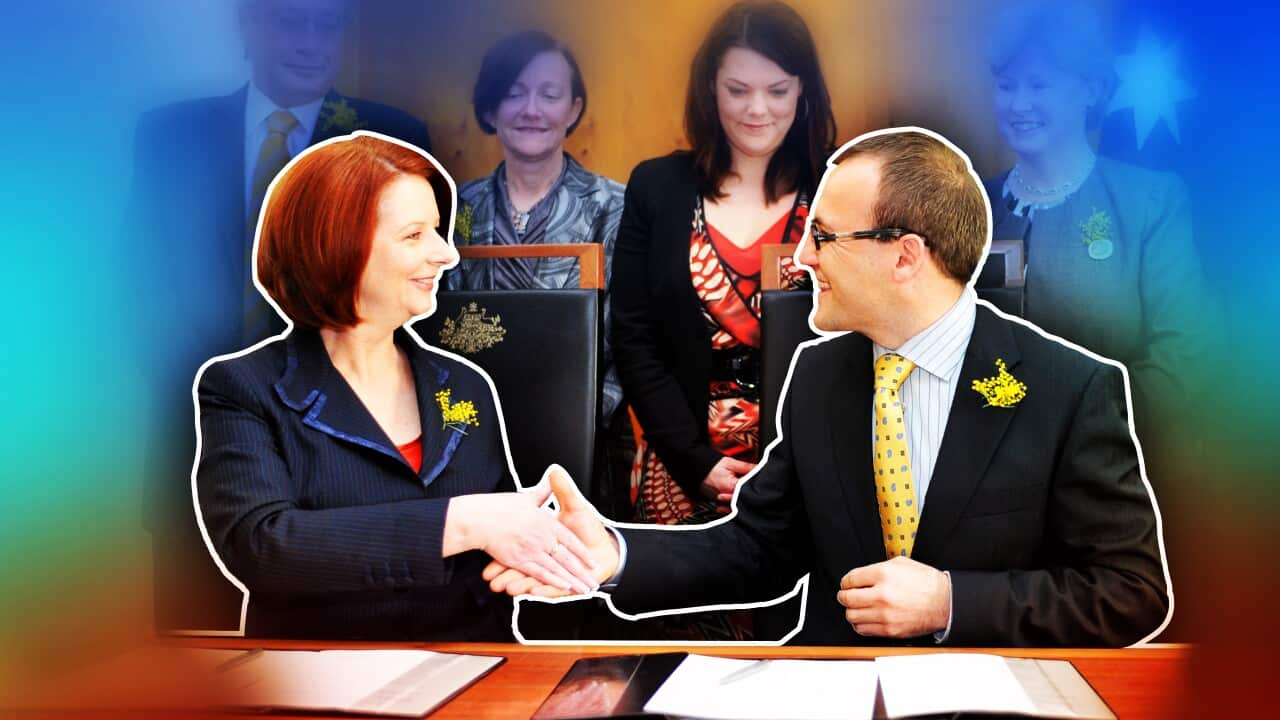In just three decades, the Greens have transformed from what was essentially an environmental protest movement to Australia's third largest party by vote.
At the 2022 election, the federal Australian Greens secured 12.2 per cent of the primary vote — an almost 2 per cent increase from the party's primary vote in 2019.
The Greens are looking to achieve even greater success on , capitalising on the bloc of generally more progressive who outnumber baby boomers for the first time this election.
As thousands flock to pre-polling centres, says the party is feeling confident.
"We're getting a terrific response on the doors, the streets and the polling booths to our plan to get dental and mental health into Medicare, finally tackle the housing and rental crisis, make child care free, and stop opening up new coal and gas mines in the middle of a climate crisis," the member for Melbourne says.
What are the Greens' main policies?
Professor Rodney Smith from the University of Sydney says the Greens have been able to position themselves quite successfully as an alternative for disenchanted Labor voters who are looking for a more solid, leftist, or progressive policy package.
Key promises from the Greens include:
- Cancelling all student HECS debt;
- Expanding Medicare to cover dental;
- Banning new coal and gas projects; and
- Introducing higher taxes on billionaires and big corporations.

Greens leader Adam Bandt outside Melbourne's Luna Park earlier this month. The Greens have long campaigned for dental treatment to be covered by Medicare. Source: AAP / Nadir Kinani
They've also unveiled a national plan to provide free school meals.
But Greens MP Max Chandler-Mather, the party's housing and homelessness spokesperson, says housing is the "defining issue" of the election.
The party has put forward its own measures to tackle the housing crisis, including discounted mortgage rates and capping rents.
It will also scrap for investors with more than one property.

(From left) Ryan MP Elizabeth Watson-Brown, Greens leader Adam Bandt, Griffith MP Max Chandler-Mather and Brisbane MP Stephen Bates. Source: SBS News
with the major parties' handling of international issues, particularly the conflict in Gaza.
The Greens have taken a firm stance, pledging to continue calling for an end to the occupation of Palestinian territories and urging Israel to halt what they describe as an ongoing genocide in Gaza,.
How powerful are the Greens?
Jill Sheppard, a professor of Australian Politics at the Australian National University, says the Greens' popularity in the Senate is particularly important.
As the Greens can't form government on their own, their policies are more an indication of how party members may vote on legislation, she says, and the number of seats they secure will determine how much power they'll wield over legislation in the upper house.
"Although we focus on the House of Representatives, particularly around an election because that's where government is won and lost, the Senate is still really important for passing legislation after the election," Sheppard says.
"There, the Greens have held the balance of power for quite a while. They are very experienced Senate negotiators, and so even if they are sidelined in some kind of independent-Labor minority government, they will still be strong in the upper house."
Polls suggest the Greens are likely to retain the five Senate seats they are contesting in this election, meaning it's likely the party will retain its powerful 11-seat upper house voting bloc.
In the House of Representatives, Prime Minister Anthony Albanese has insisted he won't do a deal with the Greens to form government if Labor fails to win a majority.
The Coalition has frequently raised the prospect of a Labor-Greens alliance as a point of concern for voters, pointing out that the Greens and Labor usually recommend that voters put the other party in the second position on how-to-vote cards.
Sheppard says that, if Labor falls short of the 76 seats it needs for a majority, it will likely first look to independents to form government.
"They probably feel like they can work with [Independents] more easily ... without offering the Greens a spot in cabinet, which would be about the worst-case scenario for the ALP," Sheppard says.
"The major parties want you to think that a hung parliament is bad because they desperately want majority government for themselves. But a hung parliament isn't bad.
"We saw between 2010 and 2013 a minority government last the full term quite successfully."
Bandt has said that in the event of a hung parliament.
The Greens' relationship with Labor
The relationship between the Greens and Labor has also been fraught with tension, with both parties fighting to capture votes on the left side of politics.
"At the national level, the relationship between the Greens and Labor has never been a particularly happy one," Smith says.
"Initially, it was because there was a tension between Labor's union base and many of the environmental concerns and policies of the Greens.
"More recently, it's had to do with that trend of left voters moving their support away from the Labor Party to the Greens, and the Greens using their position to pressure Labor to shift its legislative agenda in a more progressive direction."
'They didn't see us coming'
The Greens are defending their record number of lower house seats, three of which turned Green for the first time at the last election, shocking both major parties.
All three were inner-city Brisbane electorates. Griffith was won from Labor, while Brisbane and Ryan flipped from the Liberal National Party.
Ryan, once considered a rock-solid Liberal seat, is now a key battleground the Coalition is determined to reclaim.
"The LNP thinks they own that seat. I ousted them in 2022. They didn't see us coming then. They are certainly seeing us coming now,” Greens member for Ryan Elizabeth Watson-Brown says.
LISTEN TO

Climate Wars (Revisited): Party Time Ep 3
SBS News
26:41
Watson-Brown says she's faced verbal abuse and her signs have been vandalised throughout her campaign.
She blamed far-right groups who "want to oust [her] from the seat" and said she's also concerned about the that's being spread about her.
Greens eyeing more seats
This year, the Greens are hopeful of picking up another Queensland seat — Moreton — located in Brisbane's south.
Moreton's long-standing Labor MP Graham Perrett has held the seat since 2007 but is now retiring.
Greens candidate Remah Naji, a tertiary education worker and mother-of-two, says people have told her they are fed up with the two major parties.
"They want action on , groceries, childcare costs, rent increases, and mortgage stress," she said.
"People have told me that they're ready for change."

Greens candidate Remah Naji says she's expecting a swing toward the party in the electorate where she's running. Source: SBS News
"They're traditionally Labor voters and they're switching to the Greens," she said.
Elsewhere in the country, the Greens have their eyes on five other electorates.
They are the safe Labor seats of Wills and Macnamara in Victoria, as well as Richmond in NSW and Perth in WA.
Also in their sights is the marginal Liberal seat of Sturt, South Australia.
Sheppard says the Greens are targeting seats with specific voter demographics, seeking to emulate their success in 2022.
She points to the Greens success in the seat of Ryan.
"Ryan has a really nice mix for the Greens of university students who are frustrated about job security, housing security, and concerned about the environment," she says.
"[It also has] wealthier people who are a little bit older, who have job security, quite a lot of wealth — and they are worried about the kinds of issues that affect their grandchildren, like access to education, health and climate change.
"It's that concentration of wealthy boomers and Gen X voters, alongside university students, that makes Ryan so perfect."
Visit the to access articles, podcasts and videos from SBS News, NITV and our teams covering more than 60 languages.



